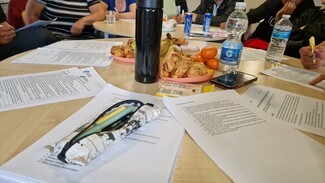Time for a Change in the ways that UK Health Services categorise Gypsies, Roma and Travellers

New study from University of Worcester calls for disaggregation of the use of ‘GRT’ within all NHS services and record-keeping and its replacement by:
- English Gypsy/Romany
- Irish Traveller
- Scottish Gypsy Traveller
- Welsh Gypsy/Romany
- Roma
- English Traveller
The physical and mental health of Gypsies, Roma and Travellers is among the worst of any ethnic minority in the UK… write the authors of the report.
Part of the reason for this is because health services do not collect accurate data about the ethnic backgrounds of patients and are therefore unable to plan for the most appropriate types of services. Many reports have pointed out this failing over the years, but little action has been taken to improve matters and communities continue to suffer.
At present, the choices open to members of Gypsy, Roma and Traveller communities when using health services are often very limited and they might only give options like ‘White Other‘. If your preferred choice is not available, you may not feel that you are even recognised by health services, let alone likely to be treated sensitively.
One survey respondent stated:
“I definitely don’t want to see ‘Gypsy and Traveller’ together. I want a distinction between ‘Gypsy’ and ‘Traveller’. They are completely different. I want a choice. If there is a choice I will choose ‘Gypsy’.”

Understanding Patient Data (part of the NHS Confederation) recognised the above problems and commissioned the University of Worcester, together with GATE Herts, to research the issues within the affected communities.
Working alongside members of Gypsy, Roma, and Traveller communities, surveys and focus groups took place across the UK in 2024, gathering 111 survey responses and meeting 86 individuals from Gypsy, Roma and Traveller communities.
A range of views came forward including a feeling of not being welcome in health services, particularly when there were no signs that the professionals knew anything about Gypsy, Roma or Traveller cultures. There was little awareness that staff working in health services, from receptionists to consultants, understood the problems that many people experience when using digital ways of accessing health care these days. More concerningly, the researchers picked up views that many health professionals were not interested in Gypsy, Roma and Traveller issues, that they had had no training about their cultures, and shared the same views that many of the public share which are distorted by TV programmes and social media.
One participant summarised such issues below:
“We suffered decades of judgement, discrimination, not being listened to or understood. Even if we do speak out, we are often dismissed especially when trying to talk to health professionals. Instead of listening they dismiss us and invalidate us and tell us how we are feeling. So, we shut down and suffer in silence and fend for ourselves. We always get treated differently.”
The fear of disclosing ethnicity was a constant issue raised in the survey and focus groups, often rooted in historical discrimination and a traditional culture which has often encouraged people to hide their identity. Participant views ranged from “I am proud to declare that I am a Gypsy” to “I would never state my ethnicity – it would only lead to bad things”. It was, however, a minority of community members who said that hiding your identity would still be the wise thing to do, whereas the majority understood why ethnicities should be shared if they could trust that the systems and attitudes of staff were non-discriminatory.
The research team believe that accurately identifying Gypsy, Roma and Traveller groups in health service records will be a key step forward in building trust, addressing health inequalities, improving cultural competence in care delivery, and tackling the stigma faced by communities.
Below - watch this video that sums up the findings and recommendations of the report:
A summary of the report’s recommendations are given below:
1. Ethnicity data should be collected that represents the specific cultures of Gypsy, Roma and Travellers in local populations.
2. Self-identification is the generally suggested approach to collecting ethnicity data and health staff should not presume, but should ask people how they would like to have their ethnicity recorded
3. Communication with community members about appointments and other health issues should be delivered in ways that community members will respond to, including phone calls and texts.
4. Health services should reach out and build connections with local community organisations, as has happened with the Lincolnshire Traveller Initiative.
5. Health services should plan health improvements with the women from the communities. Women’s Groups are seen as great places to discuss health matters and break down some taboos that prevent long and healthy living.
The following categorisations of Gypsy, Roma and Traveller were recommended to be adopted by all UK health services:
- English Gypsy/Romany
- Irish Traveller
- Scottish Gypsy Traveller
- Welsh Gypsy/Romany
- Roma
- English Traveller
The research team and Understanding Patient Data are keen that this report does not just go by the wayside like so many others, with lots of fine words but no action. A short video will be produced to further promote the messages from the research, which will emphasise that we all have a role to play in changing things. The video will highlight that community members must question why their ethnicities are not being recorded properly, that NHS frontline staff and managers must push for cultural awareness training and that Gypsy, Roma and Traveller organisations must also push for change at local and national level.
By
Peter Unwin, University of Worcester
Győző Molnár, University of Worcester
Josie O’Driscoll, CEO GATE Herts.
(Lead image (c) Damian Le Bas; content images courtesy of University of Worcester)